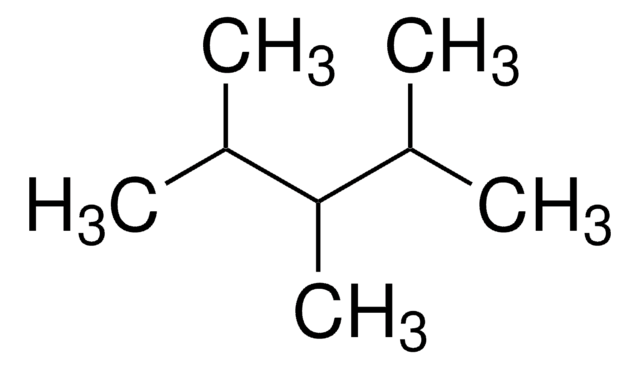650439
2,2,4-Trimethylpentane
HPLC Plus, for HPLC, GC, and residue analysis, ≥99.5%
Synonym(s):
Isooctane
About This Item
Recommended Products
grade
HPLC Plus
for residue analysis
vapor density
3.9 (vs air)
vapor pressure
41 mmHg ( 21 °C)
Assay
≥99.5%
form
liquid
autoignition temp.
745 °F
expl. lim.
6 %
technique(s)
HPLC: suitable
gas chromatography (GC): suitable
impurities
<0.01% water
<1.0 ppb Fluorescence (quinine) at 365 nm
evapn. residue
<0.0001%
halogenated residue
<10 ng/L (as heptachlor epoxide)
refractive index
n20/D 1.391 (lit.)
bp
98-99 °C (lit.)
mp
−107 °C (lit.)
density
0.692 g/mL at 25 °C (lit.)
λ
H2O reference
UV absorption
λ: 205 nm Amax: 1.00
λ: 225 nm Amax: 0.10
λ: 254 nm Amax: 0.01
application(s)
food and beverages
SMILES string
CC(C)CC(C)(C)C
InChI
1S/C8H18/c1-7(2)6-8(3,4)5/h7H,6H2,1-5H3
InChI key
NHTMVDHEPJAVLT-UHFFFAOYSA-N
Looking for similar products? Visit Product Comparison Guide
Signal Word
Danger
Hazard Statements
Precautionary Statements
Hazard Classifications
Aquatic Acute 1 - Aquatic Chronic 1 - Asp. Tox. 1 - Flam. Liq. 2 - Skin Irrit. 2 - STOT SE 3
Target Organs
Central nervous system
Storage Class Code
3 - Flammable liquids
WGK
WGK 2
Flash Point(F)
10.4 °F - closed cup
Flash Point(C)
-12 °C - closed cup
Certificates of Analysis (COA)
Search for Certificates of Analysis (COA) by entering the products Lot/Batch Number. Lot and Batch Numbers can be found on a product’s label following the words ‘Lot’ or ‘Batch’.
Already Own This Product?
Find documentation for the products that you have recently purchased in the Document Library.
Customers Also Viewed
Protocols
Technical article page on -US EPA Method 8015 (modified): GC Analysis of Gasoline Range Organics (GRO) on Equity®-1 after Purge & Trap using "M" Trap
Protocol for GC Analysis of Hydrocarbons in Gasoline on Petrocol® DH
-Xylene; Nonane; Propylbenzene; Mesitylene; 1,2,4-Trimethylbenzene; 1,2,3-Trimethylbenzene; 1,3-Diethylbenzene; 1,4-Dimethyl-2-ethylbenzene; 1,2-Dimethyl-4-ethylbenzene; Durene; 1,2,3,5-Tetramethylbenzene; 1,2,3,5-Tetramethylbenzene; 2-Methylnaphthalene (β)
GC Analysis of Hydrocarbons in Gasoline on Petrocol® DH, Isothermal
Our team of scientists has experience in all areas of research including Life Science, Material Science, Chemical Synthesis, Chromatography, Analytical and many others.
Contact Technical Service




